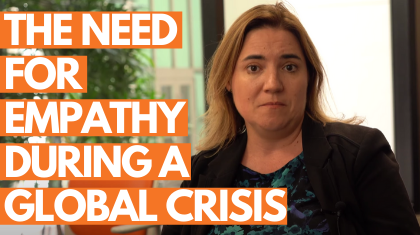Loss Factors
In a time of global uncertainty, individuals at all levels of the organizational hierarchy contend with several types of losses:
Loss of jobs. The widespread health risk has led to extensive job losses and reduction in hours. For affected individuals, this period is highly disruptive and traumatic.
Loss of comfort. Employees that have moved from their comfort zone at work to a remote setting, using previously unfamiliar technology, face stressful changes.
Loss of security. Medical practitioners, grocery store workers, delivery drivers, and others whose jobs provide essential functions for today’s societal needs may no longer feel safe when going to work.
Loss of emotional wellbeing. Employees must also cope with feelings of fear and anxiety caused by a worldwide health threat.
Loss of time. Individuals working from home with young children are facing double duty, now teaching their children from home in addition to carrying out job requirements.
Elements of Empathy
At this stressful time, empathy is critical. Empathy consists of a cognitive and an emotional component. All members of an organization should strive for cognitive empathy, or a mindful perspective of another’s unique circumstance. Acting on this perspective with emotional empathy, displaying compassion by reaching out and offering emotional support, builds organizational connections and strengthens relationships.
Responding with Empathy
Supervisors and subordinates alike should focus on responding with cognitive and emotional empathy. Even if limited to virtual communication, connecting with colleagues on a regular basis can help them stay motivated.
Employers should also be sensitive to the various loss factors that affect employees. Performance evaluations should consider everyone’s unique situation. An employee with children, for example, carries heavier time pressures than one without the added responsibilities.
The sense of understanding given and received during this time of crisis will create a more supportive workforce when colleagues are able to work side by side again.
For additional COVID-19 Thought Leadership coverage and business resources from Miami Herbert Business School, click here.

